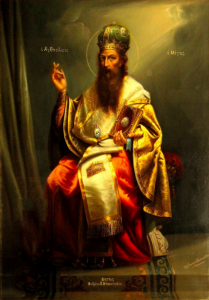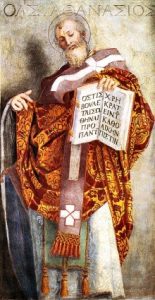
Saint Basil the Great
Feast June 14th
Bishop, Doctor of the Church (329-379)
Basil was born into the wealthy family of Basil the Elder, a famous rhetor, and Emmelia of Caesarea, in Pontus, around 330. His parents were renowned for their piety. His maternal grandfather was a Christian martyr, executed in the years prior to Constantine I’s conversion. His pious widow, Macrina, herself a follower of Gregory Thaumaturgus (who had founded the nearby church of Neocaesarea), raised Basil and his four siblings Macrina the Younger, Naucratius, Peter of Sebaste and Gregory of Nyssa. Peter and Gregory became bishops, and with his mother and his sister, are honored as Saints.
Basil received more formal education in Caesarea Mazaca in Cappadocia (modern-day Kayseri, Turkey) around 350-51.
He studied with great success in Athens, where he formed a tender and perpetual friendship with Saint Gregory Nazianzen. At the time he taught oratory. The study of philosophy had already raised him above all worldly ambition, causing him to dread the honors of the world. At the end of his sojourn at Athens, Basil was well equipped to be a teacher. He refused the splendid offers of the citizens of Neo-Caesarea, who wished him to undertake the education of the youth of their city. Basil’s life changed radically after he encountered Eustathius of Sebaste, a charismatic bishop and ascetic. Abandoning his legal and teaching career, Basil devoted his life to God. A letter described his spiritual awakening: “I had wasted much time on follies and spent nearly all of my youth in vain labors, and devotion to the teachings of a wisdom that God had made foolish. Suddenly, I awoke as out of a deep sleep. I beheld the wonderful light of the Gospel truth, and I recognized the nothingness of the wisdom of the princes of this world.”
He gave up all things to become the father of monastic life in the East. His older sister, Saint Macrina, encouraged him when he abandoned the greater part of his inheritance.
He retired into Pontus, where his sister was the Superior of a convent, into which his mother also had entered; there he founded a monastery on the opposite side of the river from the convent, and governed it from 358 to 362. He founded several other religious houses in the same region, both for men and for women. It was for them that he composed his ascetic works, including his famous “Rule,” still followed by the monks of the Orient.
He then resigned, leaving his office to his brother, Saint Peter of Sebastus, to retire in prayer. Saint Gregory came to join his friend for a time, in response to his invitation. Ever afterwards, Basil would recall with regret the peace and happiness they had enjoyed, singing Psalms, studying Scripture, keeping vigil in prayer, and disciplining their flesh by manual work. It was only in 363 that this holy hermit was ordained a priest by Eusebius of Caesarea in Cappadocia.
The Arian heretics, supported by the court, were then persecuting the Church, and Basil was summoned from his retirement by his bishop to give aid against them. His energy and zeal soon mitigated the disorders of the Church, and his solid and eloquent words silenced the heretics.
In 370, Eusebius died, and Basil was chosen to succeed him, and was consecrated bishop on June 14, 370. His new post as bishop of Caesarea also gave him the powers of exarch of Pontus and metropolitan of five suffragan bishops, many of whom had opposed him in the election for Eusebius’s successor. It was then that his great powers were called into action. Hot-blooded and somewhat imperious, Basil was also generous and sympathetic. He personally organized a soup kitchen and distributed food to the poor during a famine following a drought. He gave away his personal family inheritance to benefit the poor of his diocese.
His letters show that he actively worked to reform thieves and prostitutes. They also show him encouraging his clergy not to be tempted by wealth or the comparatively easy life of a priest, and that he personally took care in selecting worthy candidates for holy orders. He also had the courage to criticize public officials who failed in their duty of administering justice. At the same time, he preached every morning and evening in his own church to large congregations. In addition to all the above, he built a large complex just outside Caesarea, called the Basiliad, which included a poorhouse, hospice, and hospital, and was compared by Gregory of Nazianzus to the wonders of the world
When Saint Basil was summoned by the emperor Valentius to admit the Arians to Communion, the prefect in charge, finding that soft words had no effect, said to him, “Are you mad, that you resist the will before which the whole world bows? Do you not dread the wrath of the emperor, nor exile, nor death?” “No,” said Basil calmly; “he who has nothing to lose need not dread loss of goods; you cannot exile me, for the whole earth is my home; as for death, it would be the greatest kindness you could bestow upon me; torments cannot harm me; one blow would end both my frail life and my sufferings.” The prefect answered, “Never has anyone dared to address me thus.” “Perhaps,” suggested Basil, “you never before measured your strength with a Christian bishop.” The emperor desisted from his commands.
Saint Basil’s entire life was one of suffering, both physical and moral; he lived amidst jealousies, misunderstandings and seeming disappointments. However, he sowed the seed which bore good fruit in future generations. He was God’s instrument to resist the Arians and other heretics in the East, and to restore the spirit of discipline and fervor in the Church. He died peacefully in 379 at the age of fifty-one, and is venerated as a Doctor of the Church.
References and Excerpts
[1] “St. Basil the Great,” New Advent, 2012. [Online]. Available: http://www.newadvent.org/cathen/02330b.htm. [Accessed 1 June 2016].
[2] “Basil of Caesarea,” Wikipedia, [Online]. Available: https://en.wikipedia.org/wiki/Basil_of_Caesarea. [Accessed 1 June 2016].
[3] “Saint Basil the Great,” Magnificat, 24 February 2016. [Online]. Available: http://sanctoral.com/en/saints/saint_basil_the_great.html. [Accessed 1 June 2016].

